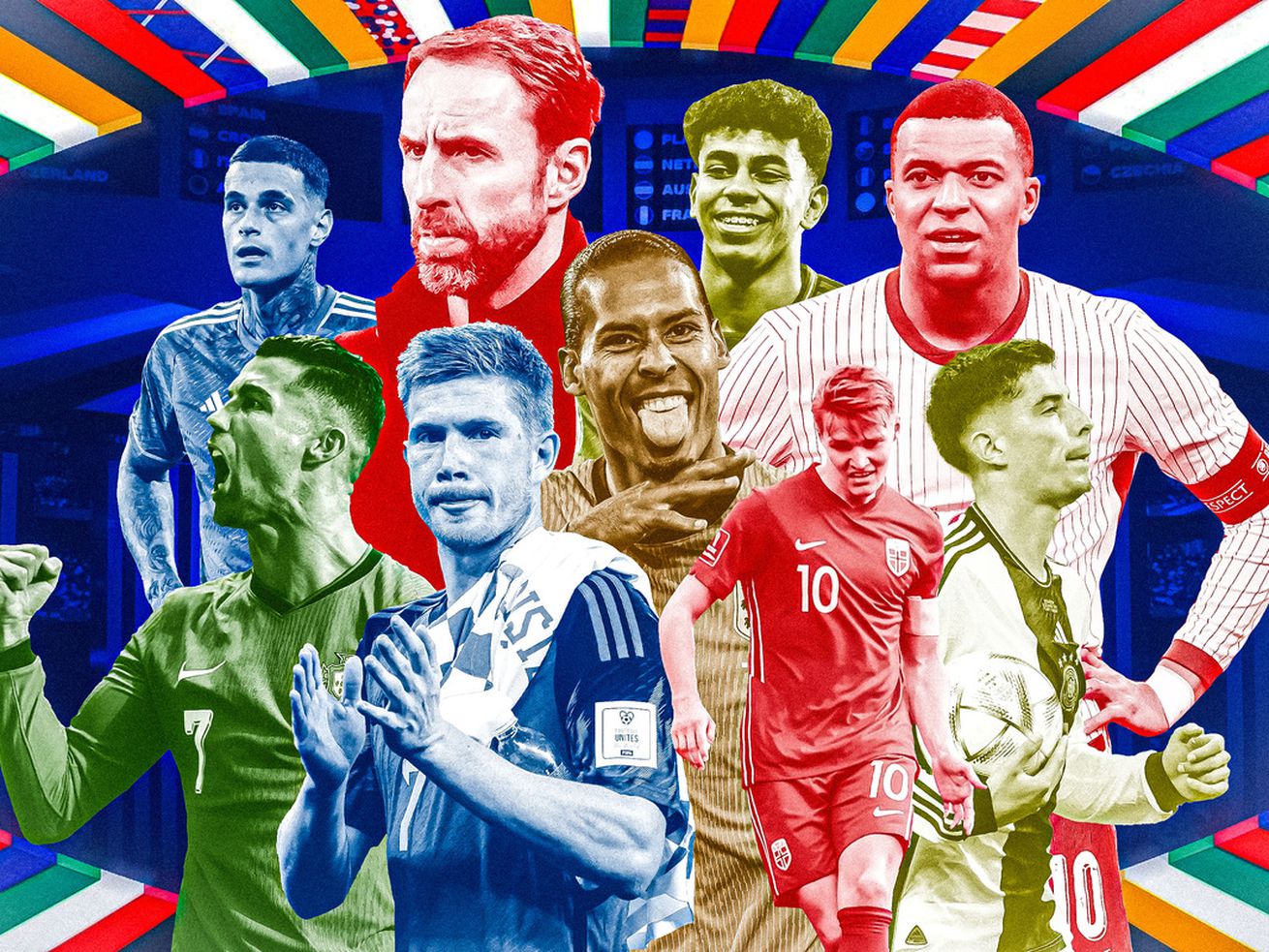
Our guide to all 24 teams, key players to watch, and our favorite bets
Three years after a dramatic penalty shoot-out culminated with Italy defeating England to win its second European Championship, the 2024 Euros kick off this Friday in Munich. Twenty-four European nations in total will compete for the continent’s most prestigious soccer prize, considered second in importance only to the World Cup because of the depth of footballing talent across Europe. Host Germany begins the tournament by taking on Scotland. After group play concludes, the remaining 16 teams enter the knockout round for a chance to ultimately play in the Euro 2024 final on July 14 in Berlin.
The Euros have produced some shock champions this century, most notably Portugal in 2016 and Greece in 2004. Italy won its recent championship in 2021 despite failing to qualify for the World Cup in 2018 and 2022. Only five players from the starting 11 of that Euro 2020 final remain in this Italian squad, and manager Roberto Mancini departed the national team last August.
France has been one of the most successful footballing nations in the past eight years, and manager Didier Deschamps remains in charge of Les Bleus. France was runner-up in Euro 2016, won the World Cup in 2018, and then lost the World Cup final to Argentina in 2022. Featuring mega-superstar Kylian Mbappé, the French are the second favorites to lift the trophy in the betting markets. The top five nations—England, France, Germany, Portugal, and Spain—may look the strongest on paper, but a tournament historically known for its chaos and Cinderella runs should create plenty of drama throughout the 51 matches.
American soccer fans should prepare for their workplace productivity to decline over the next month, as matches begin as early as 9 a.m. EST and kick off as late as 3 p.m. EST.
To preview Euro 2024, I ranked all 24 teams in the tournament, nominated a key X-factor player to watch for each, and provided some bets I’ve made.
Note: All expected goals (xG) are from FootyStats.
1. England (Group C)
Non-England fans are probably tired of the phrase “It’s coming home,” but they’ll hear it again and again over the next month anyway because this squad is as good as any Gareth Southgate has ever had. Whatever you believe about the origins of the sport known as football or why England’s men haven’t won a major international trophy since 1966, the team combines the best defense in the Euro 2024 qualifying round with emerging superstar attackers.
No team conceded fewer expected goals per match than England in all Euro qualifying matches. Southgate has consistently prioritized defensive solidity throughout his tenure, often at the expense of maximizing the ceiling of his talented attackers. This squad isn’t without its questions, as center backs Harry Maguire (injury) and Jarrad Branthwaite (manager decision) won’t be involved, and John Stones has struggled with fitness most of the club season. Usual left back Luke Shaw is in a race against the clock to be fit enough to start the tournament. Despite these defensive questions, the system established under Southgate has given England an extraordinarily high international floor.
England will not get the same bonus it had in Euro 2020, when six of the nation’s seven matches, including the semifinal and final, were played in its national stadium of Wembley. Given that Jude Bellingham, Cole Palmer, and Phil Foden all just had career breakout seasons at their respective clubs and Harry Kane remains one of the best strikers in the world, the defensive question marks might force Southgate to lean on England’s supreme attacking talent more than he’d usually prefer.
The narrative surrounding England’s failures at the international level is simply a narrative of yesteryear. English fans may indeed have been a bit delusional about their talent and aspirations in the past, but a penalty shoot-out loss to Italy in 2021 and a coin-flip loss to eventual runner-up France in Qatar in 2022 show that England is a worthy favorite to win this competition. We’ll quickly learn how Southgate is approaching this tournament from his role for Bellingham. Whether he’s a more deep-lying midfielder or a goal-scoring threat will be instructive.
Player to watch: Jude Bellingham (Real Madrid)
2. Spain (Group B)
International football doesn’t typically highlight the pressing and possession structures that often dominate the highest levels of European club football. France and Morocco, for example, made the World Cup semifinals in Qatar despite passive defensive approaches that allowed opponents to keep possession of the ball. Spain, renowned for its intricate tiki-taka buildup play, will control more possessions and press more than every other team in this tournament, barring maybe Germany. When the press and possessions go well with the correct assortment of talent, you get a run like Roberto Mancini’s Italy in Euro 2020. The Italians’ pressing structure—combined with the midfield quality of Jorginho and Marco Verratti, the presence of two highly experienced center backs in Giorgio Chiellini and Leonardo Bonucci, and the heroics of goalkeeper Gianluigi Donnarumma—led to a title. Spain has not had the consistent goal-scoring production and goalkeeping to combine with its midfield and territorial dominance.
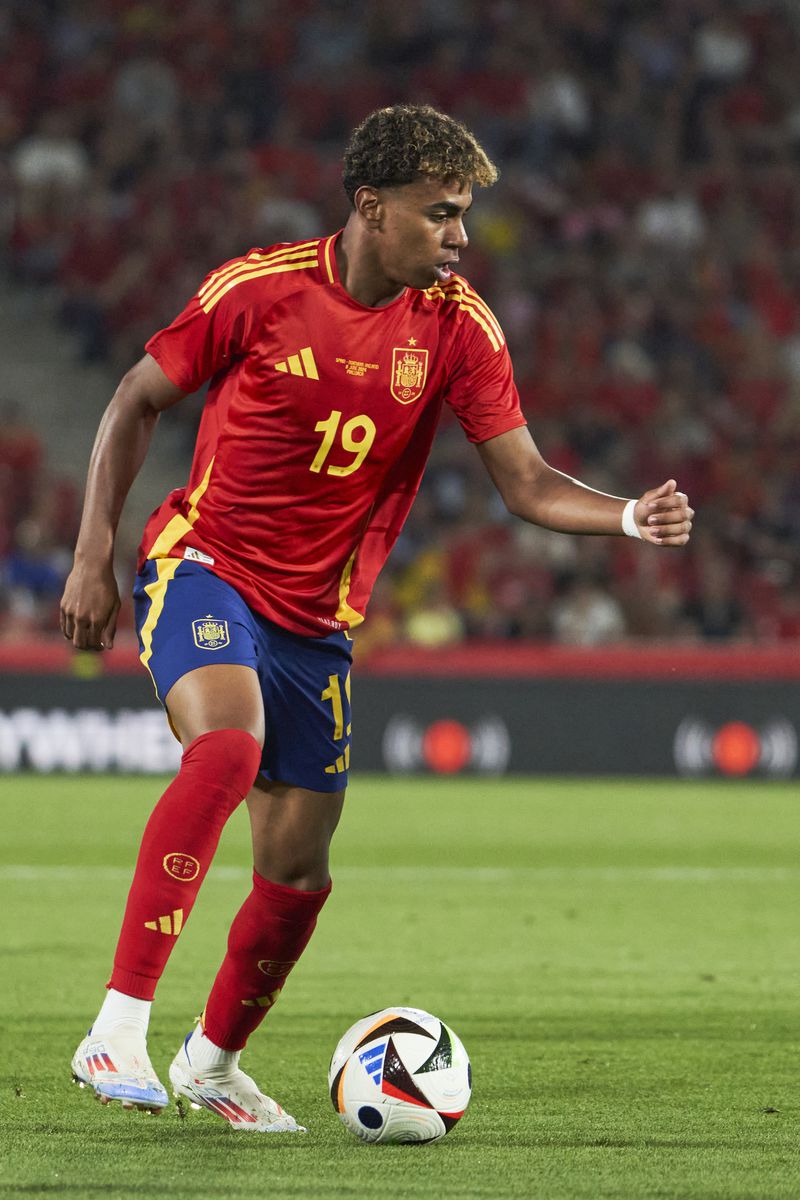
Photo by Rafa Babot/Getty Images
As a result, Spain lost penalty shoot-outs to Russia at the World Cup in 2018, Italy at the 2021 Euros, and Morocco in the 2022 World Cup. Goalkeeping isn’t a strength for La Roja, but losing three coin flips in a row is also some tough misfortune. The attack will yet again rely on the maligned but generally underrated Álvaro Morata. The difference between Spain in Qatar and now is its manager and the two emerging star wingers it can play more directly if needed. Spain promoted U-23 manager Luis de la Fuente to replace Luis Enrique, but the squad’s play style will largely be similar. Lamine Yamal, 16, will become the youngest player in Euro history when he plays as a right-winger for Spain in this tournament. Nico Williams, 21, is a dynamic left-sided winger who is likely to start next to Morata.
Spain still has elite defensive midfielder Rodri and the young passing talents of Fabián Ruiz, Pedri, and Dani Olmo. They’ll be challenged by their schedule, as Croatia, Italy, and Albania are a tough group. With five elite teams contending in this year’s Euros, two of them are destined for a collision course in the quarterfinals. As of now, that will most likely be Germany vs. Spain on July 5 in Stuttgart.
Spain will outpass and out-possess everyone in this field, but like Germany, their success will be a question of their efficiency in front of goal and defending in transition behind their aggressive press.
Player to watch: Lamine Yamal (Barcelona)
Bets: Spain and Croatia dual forecast (+230), Spain to win group (-110)
3. Germany (Group A)
Germany has largely been a disaster on the international stage since its Euro 2016 semifinal loss to France. The Germans failed to get out of their World Cup group in 2018 and then lost 2-0 to England in the round of 16 in Euro 2020 (and before that, they’d come close to losing to Hungary and going out in the group stage once again). Manager Hansi Flick was expected to turn the German national team around after his very successful stint at Bayern Munich, but a draw with Spain and a shock loss to Japan sent Germany out in the group stage in Qatar. That means the team hasn’t won a tournament knockout tie since a June 2016 penalty shoot-out victory against Italy in the Euro quarterfinals. Flick is now managing Barcelona, and the national team has hired the country’s brightest young coaching mind to sort out its personnel deficiencies: Julian Nagelsmann.
Known for its ruthless efficiency in years past, Germany’s inefficiencies in front of goal knocked it out of Qatar. Playing direct in transition and defending without the ball have become more important than possession dominance in international soccer, so Germany’s issues with defensive transition have led to significant issues in goal prevention. In Qatar, no nation created more expected goals in the group stage than Germany, and Nagelsmann’s best solution seems to be starting Kai Havertz, who is not a traditional striker but remains a quality all-around forward.
The reason to be excited about Germany is the two players who play right behind Havertz. Jamal Musiala and Florian Wirtz are budding superstars for Bayern Munich and Bayer Leverkusen, respectively. Both have elite dribbling ability and chance creation skills in space.
Toni Kroos is in his final tournament as the midfield maestro; Joshua Kimmich is a more than capable right back who can also play defensive midfield when Germany is in possession and doesn’t want to be exposed. Germany will play this tournament at home, and no team in its group (Hungary, Scotland, Switzerland) has the firepower to keep pace. Nagelsmann lost to Turkey and Austria in friendlies in the fall but did beat a full-strength France and Netherlands this spring. Jonathan Tah and Antonio Rudiger are a reliable center back duo, and Nagelsmann’s usually complex possession structures are Germany’s best bet for solving its transition woes. If Havertz continues his good finishing run at Arsenal this spring, Germany will be as good as anyone in this tournament. There’s not much width in the projected starting XI, which makes substitute winger Leroy Sané and left back Maximilian Mittelstadt especially important. A potential quarterfinal against Spain looms.
Player to watch: Jamal Musiala (Bayern Munich)
4. France (Group D)
Didier Deschamps is the longest-tenured manager at this tournament and one of the three longest-serving European international managers ever. Given that France lost the Euro final in 2016, won the World Cup in 2018, and then finished as runner-up to Argentina in the epic 2022 final, Deschamps probably has the job for life if he wants it. France could field two entirely different teams that could make a deep run in this tournament. Interestingly, Deschamps brought veteran N’Golo Kanté into the squad even though he looked diminished as a defensive midfielder the last time Europe saw him at the club level, before his move to Saudi Arabia. Deschamps also seems to prefer Dayot Upamecano and Ibrahima Konaté at center back to Arsenal’s William Saliba, widely recognized as one of the best in his position in the Premier League. Thirty-seven-year-old Olivier Giroud has been the go-to international striker for an entire generation, but he’s MLS bound, and Marcus Thuram’s excellent form for Inter this year will at least make things tricky for Deschamps.
France is a menacing opponent because it is capable of creating chances from everywhere. Kylian Mbappé is widely considered the best player in the tournament. Whether he’s staying wide out of possession as an immediate outlet for transition or inverting toward the center of the pitch when France is in possession, he’s a nightmare matchup for any defense. His combinations with fullback Theo Hernández on the left flank were an essential piece of France’s attacks in the World Cup. Antoine Griezmann might be past his peak, but he has played at a high level as a primary creator for Atlético Madrid in the past two seasons.
The emergence of young midfielders like Eduardo Camavinga and Aurélien Tchouameni has improved France’s defense, which looked quite shaky in the Euro 2020 tournament. France is extremely passive out of possession and offers little to no pressing, which can leave it vulnerable to quality possession-based attacks. Germany showed this in its 2-0 win against France in a March friendly. Deschamps has built the team to be solid in defensive transitions, though, and France beat the Dutch 4-0 and 2-1 in qualifying for the tournament.
Player to watch: Kylian Mbappé (Real Madrid)
5. Portugal (Group F)
It’s always seemed that the whole of Portugal has been less than the sum of its parts since its Euro 2016 shock win, and that led to the departure of manager Fernando Santos following a stunning 1-0 defeat to Morocco in the World Cup quarterfinals. From an overall talent perspective, this Portugal team is miles better than it was in 2016, and the biggest question facing new manager Roberto Martínez is the usage of Portugal’s best player ever: Cristiano Ronaldo. Ronaldo, 39, is playing club football full-time in Saudi Arabia now. His controversial benching in the round of 16 against Switzerland at the 2022 World Cup coincided with a Portugal goal-scoring outburst, a Goncalo Ramos hat trick, and a 6-1 Portugal victory. You could argue that the time is ripe for a younger generation of Portuguese attackers to take over, but Ronaldo continues to make a case for himself with a brace in a friendly against Ireland on Tuesday.
Ronaldo started nine of the 10 qualifying matches, so it’s clear that he’s a large part of Martínez’s plans in Germany. The eye test shows that Ronaldo has been less involved in the buildup, and Portugal primarily relies on him to poach goals.
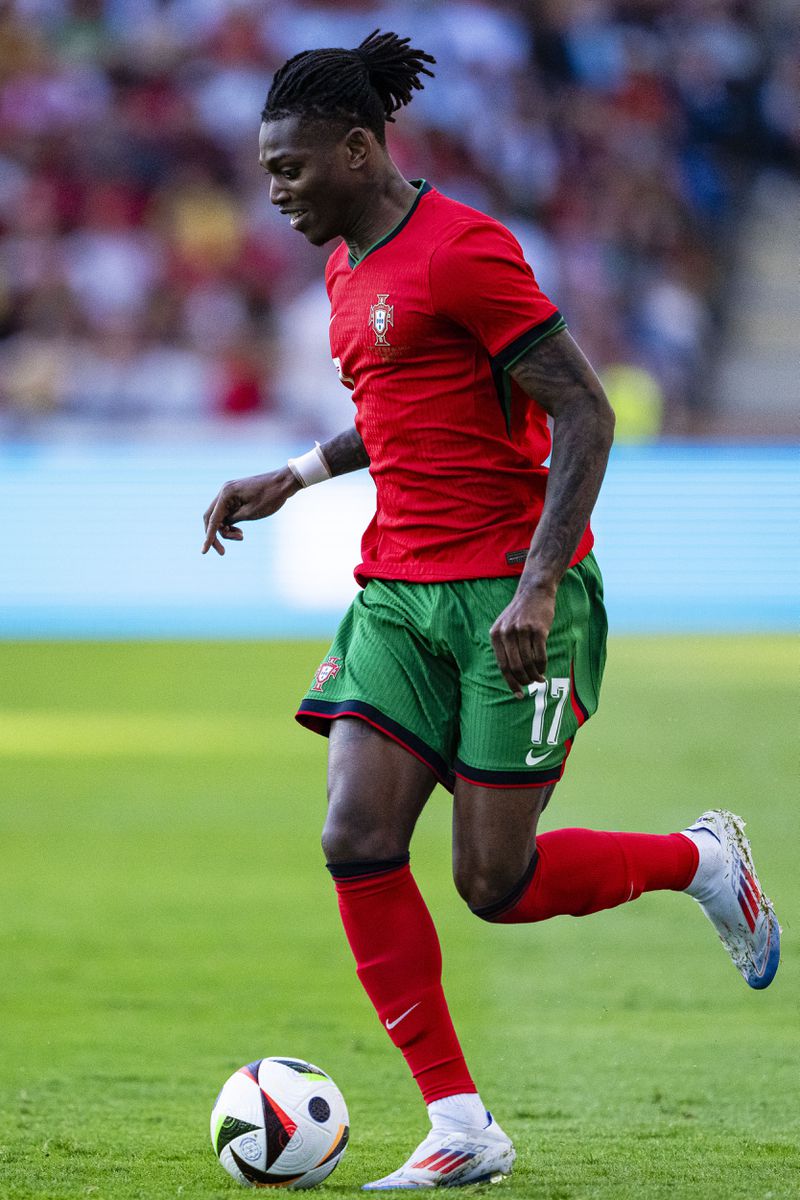
Photo by Pedro Loureiro/Eurasia Sport Images/Getty Images
In his previous tenure with the Belgian golden generation, Martínez never quite reached glory, but you can make the case that Portugal is better equipped to handle his preferred style. The lack of midfield ball winning and effective transition defense often left Martínez’s Belgium team vulnerable, despite its clear attacking talent (more on that later). Portugal’s biggest problem under Santos was being too pragmatic and defensive, which prevented it from consistently scaling up its attacking patterns when facing quality defensive sides. Portugal’s losses to Morocco and Belgium in the last two knockout tournaments featured a lot of possession in the final third and very little actual chance creation.
Martínez’s Portugal squad didn’t have problems with being more explosive and dynamic in the Euro qualifiers. The group was pretty weak overall, but only France created more xG per match and had a better xG difference than Portugal. João Palhinha is an excellent defensive midfielder who runs around and breaks up play, and it works because the elite on-ball quality of Bernardo Silva and Bruno Fernandes in the midfield means that he doesn’t have much responsibility as a passer.
Winning the group would likely put Portugal on the side of the draw opposite France and England.
Player to watch: Rafael Leão (AC Milan)
Bet: Group F highest-scoring group (+450)
6. Netherlands (Group D)
I’ve placed the Netherlands as the best of the rest because of Belgium’s defensive questions and Italy’s goal-scoring issues. The Netherlands had a pretty mediocre attack in Qatar and relied heavily on the individual brilliance of Cody Gakpo’s shooting ability to score goals. New manager Ronald Koeman opted to start Brian Brobbey as a striker, flanked by Memphis Depay and Jeremie Frimpong, in a friendly win against Canada on Thursday. There are a lot of questions about how the Dutch will set up tactically because of Frimpong’s default position as a right wing back and the lack of a natural counterpart on the left side. Frimpong played right wing back for Leverkusen but essentially operates as a winger in most setups.
The Netherlands’ strength is at center back, where it has Virgil van Dijk, Matthijs de Ligt, Nathan Aké, Stefan de Vrij, and Micky van de Ven as options. Then there’s the aging Daley Blind, who still has elite passing range but could be exposed on the flank because of his lack of athleticism. Blind played against Germany in a March friendly, but Koeman started van de Ven at left back in a back four on Thursday.
It’s not easy to sort the Dutch into a clear formation, but Koeman played Frimpong as a winger and Feyenoord’s Lutsharel Geertruida as a right back against Canada. Then there are the injury questions. Forward Donyell Malen came off the bench for Dortmund in the Champions League final, but he hasn’t played a full 90 since March. It’s not clear who the best striker option is for the Dutch, but it’s fair to expect to see plenty of Wout Weghorst; the Netherlands will also need Xavi Simons’s elite midfield club form at RB Leipzig to translate to the national team. Injuries to Frenkie De Jong and Teun Koopmeiners leave the team thin in the midfield, but Joey Veerman’s emergence for PSV Eindhoven this season could be a major boost.
Group D is one of the toughest two groups, and the Netherlands will be tested by favorites France and dark horse Austria in the final group game. After missing the 2018 World Cup, the Netherlands has the right mix of youth and experience to make the quarterfinals and pull off a surprise or two. If it finishes as runner-up in Group D, it’ll face a weak runner-up from E and likely Portugal en route to the semifinal. Given the upside the Netherlands has to leap into Europe’s elite if the pieces come together correctly, it’s my favorite outright bet to win this whole thing at 20-1.
Player to watch: Jeremie Frimpong (Bayer Leverkusen)
Bet: Netherlands to win the Euros (+1800)
7. Italy (Group B)
Serie A winner Luciano Spalletti left Napoli and eventually replaced Roberto Mancini as the manager of the Italian national team. Prior to Spalletti’s arrival last year, Italy had been the world’s most enigmatic soccer team for roughly half a decade. It failed to qualify for the World Cup in 2018, won Euro 2020, and then failed to make the World Cup again in 2022 after a shock loss to North Macedonia. Qualifying for this tournament wasn’t easy, either. The Italians needed a draw against Ukraine on the final day of qualifying (at a neutral site in Germany) to finish second in the group behind England.
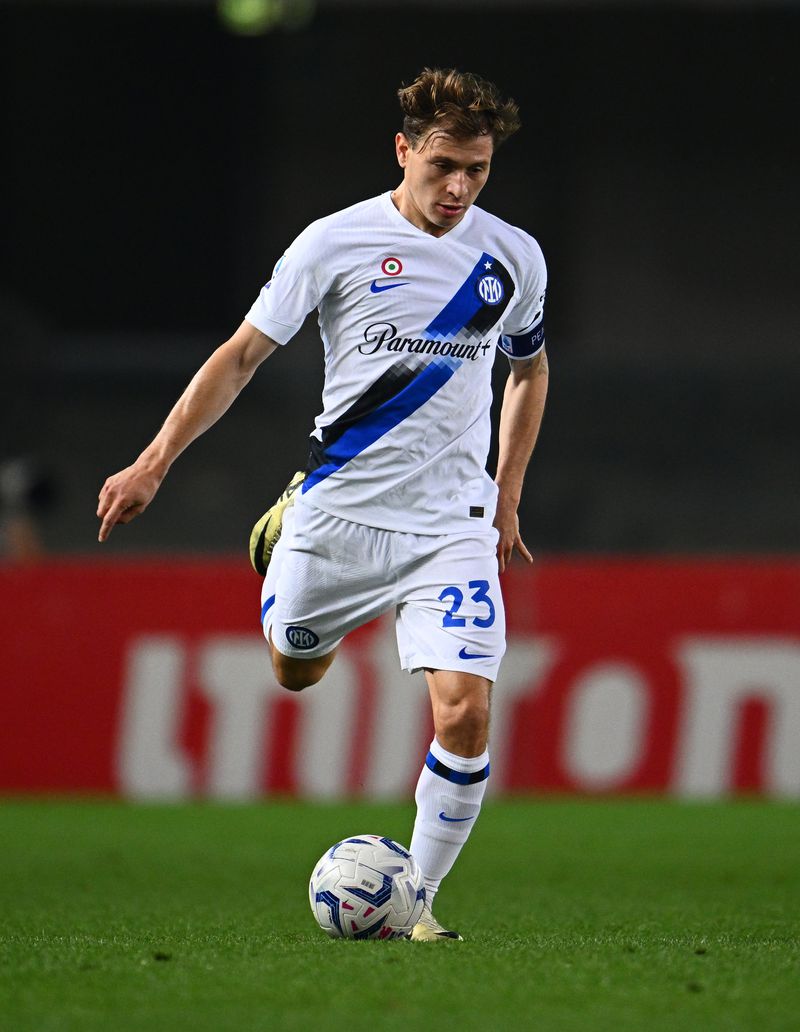
Photo by Mattia Ozbot – Inter/Inter via Getty Images
If Italy finishes second in this group, which oddsmakers expect, its most likely quarterfinal matchup would be England. England beat Italy 2-1 in Naples and 3-1 in London in the qualifying period. A lot has changed for both national teams since the 2021 Wembley final. Only five players from that Italy starting XI remain with the national team. Reliable goal scorers Lorenzo Insigne and Ciro Immobile weren’t called up. Federico Chiesa has struggled to find his form after his ACL injury. The legendary center back pairing of Leonardo Bonucci and Giorgio Chiellini has moved on from the national team.
The biggest question is where the goals will come from. The Italians are expected to roll out a three-man midfield of Jorginho, Nicolò Barella, and Davide Frattesi, who make up the team’s unquestioned strength. The Italians also have a young crop of center backs and the excellent shot-stopping goalkeeper Gianluigi Donnarumma.
Spalletti has been hesitant to trust in-form striker Gianluca Scamacca, who helped carry Atalanta to the Europa League title and a top-four finish in Serie A this year. Behind him, the options are extremely limited. If Chiesa still can’t find his form, Italy will need to win low-scoring contests to go deep in this tournament.
Player to watch: Nicolo Barella (Inter Milan)
Bets: Italy under 6.5 goals (+115)
8. Belgium (Group E)
Belgium’s golden generation had already ended before the 2022 World Cup, and the Belgians bottomed out with a third-place group finish behind Morocco and Croatia in Qatar. The Red Devils still have a lot of remaining talent and a few potential breakout stars, but on paper the defense is clearly an issue without many solutions, given a lack of talent and the team’s aging players. The fullbacks have always been a weak point, even during the height of that golden era. The center backs are also an issue, given that Jan Vertonghen is now 37 years old and Wout Faes has been inconsistent for his club and country squads.
The intrigue for Belgium comes in the midfield and the attack. Kevin De Bruyne and Romelu Lukaku remain among the most dynamic attacking duos in the sport. Lukaku has had some high-profile misses throughout his career, but that doesn’t take away from his consistently solid underlying numbers. Jérémy Doku broke out in the second half of Euro 2020 when he single-handedly wrecked Italy’s defense with his direct play as a wide forward. Now he’s shown his immense talent at Manchester City. Belgium could unleash him, and with Amadou Onana and Orel Mangala, it now has considerably more ball-winning talent in midfield than past iterations of Belgium did. Combine that with Arsenal super-sub Leandro Trossard, and the Belgians shouldn’t have trouble scoring goals in this tournament.
As a potential post-hype team facing lower expectations, Belgium deserves a decent look, but its defense isn’t reliable enough to warrant the squad a spot in the top tier. Lukaku could score a lot of goals in a weak group to make a Golden Boot run. That award is often won and lost in the group stage, when goals are easier to come by.
Player to watch: Jérémy Doku (Manchester City)
Bet: Romelu Lukaku, Golden Boot +1600
9. Croatia (Group B)
Croatia is a nation of 3.9 million people that has dramatically outperformed expectations for a nation its size for an entire generation of major tournaments. Croatia made the World Cup final in 2018 and followed it up with a third-place finish in Qatar after knocking out Brazil. Croatia’s success in penalty shoot-outs has surely inflated our overall perception of this group, but it has also relied on consistently good defense and quality midfield play. Luka Modric, 38, is on his last legs but can still give valuable minutes to Croatia this summer. The midfield double pivot of Mateo Kovacic and Marcelo Brozovic is one of the more formidable in this tournament.
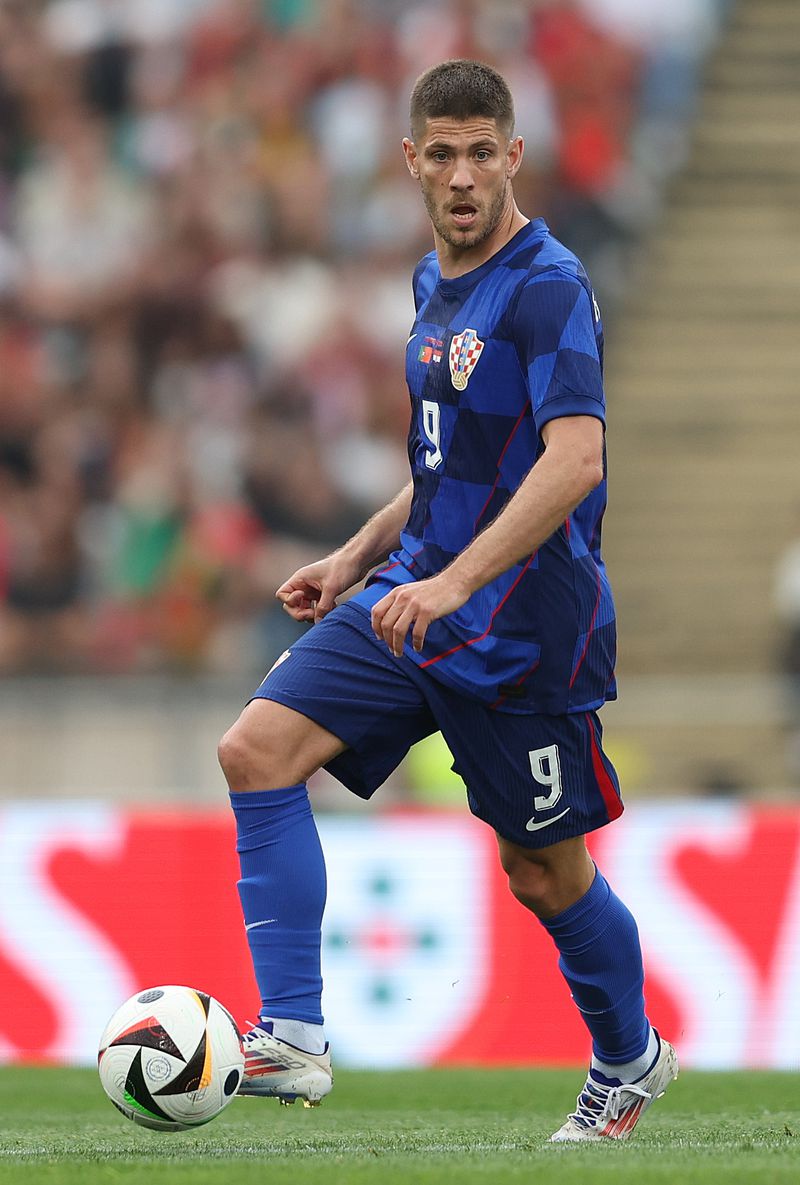
Photo by Igor Kralj/Pixsell/MB Media/Getty Images
With young star Joško Gvardiol anchoring the defense, the Croatians project as one of the better defensive teams in this tournament. As in Qatar, the question is where the goals will come from.
Croatia made the finals of the Nations League last summer and played out a goalless draw with Spain that ended on penalties. It failed to create more than one expected goal in five of its seven World Cup matches in Qatar. The goal-scoring load heavily relies on the nearly 33-year-old Andrej Kramaric, who had 15 goals for Hoffenheim this season.
Goals will be hard to come by, but Croatia’s midfield control will make it a tough out yet again.
Player to watch: Andrej Kramaric (Hoffenheim)
Bet: Croatia total goals scored under 5.5 (-125)
10. Austria (Group D)
I’m willing to acknowledge that I have Austria as a top-10 team in this field likely because of some recency bias. But the next handful of teams are all in the “former dark horse but now on washed watch” tier, so I’m getting aggressive with Ralf Rangnick’s impressive pressing machine here. Austria presses as much as any international team, and while that could lead to disaster against the superior talents of France and the Netherlands, the Austrians have proved that as a collective they are more than the sum of their parts.
Even though star man David Alaba has been named Austria’s “non-playing captain” due to injury, I’m bullish on the team’s chances of escaping the group and maybe pulling off an upset in the round of 16, depending on the draw.
In qualifying, Austria completed the double against a solid Sweden team that usually plays in the Euros and World Cup. It nearly topped Belgium in the group as a whole, playing to a 1-1 draw in Brussels. Austria has since beaten Turkey, Slovakia, and Serbia by a combined score of 10-2. It also stunned Germany 2-0 in a friendly last November.
The Austrians do not spend a lot of time in possession and use a very direct attacking style once they nick the ball from their opponents. Given their placement in a group with two excellent transition-attacking teams, the Austrian counter-press is sure to be put to the test. They have a bit of a boom or bust potential. Austria may get exposed if France and the Netherlands can isolate its superior talent in space. Austria really struggled in the 2022 Nations League, with losses to France, Denmark, and Croatia, before this recent excellent run through qualifying.
Player to watch: Christoph Baumgartner (RB Leipzig)
Bet: Austria to advance (-125)
11. Switzerland (Group A)
Switzerland’s historic win against France in penalties was one of the highlight matches of Euro 2020, but it’s a bit concerning just how similar the names are on its 2024 roster. It’s reliant on many players aged 30 and up, which can always sound some alarm bells in the international soccer scene. Xherdan Shaqiri, Remo Freuler, Granit Xhaka, and Ricardo Rodriguez, all north of 30, are expected to be outfield starters.
I’ve long been a fan of Switzerland because of its high floor and consistency in possession. This generation of players has a ton of experience together. The problem is, where will the goals come from? Breel Embolo is recovering from an ACL injury, which puts a lot of pressure on young attackers Zeki Amdouni and Noah Okafor and Bologna breakout winger Dan Ndoye.
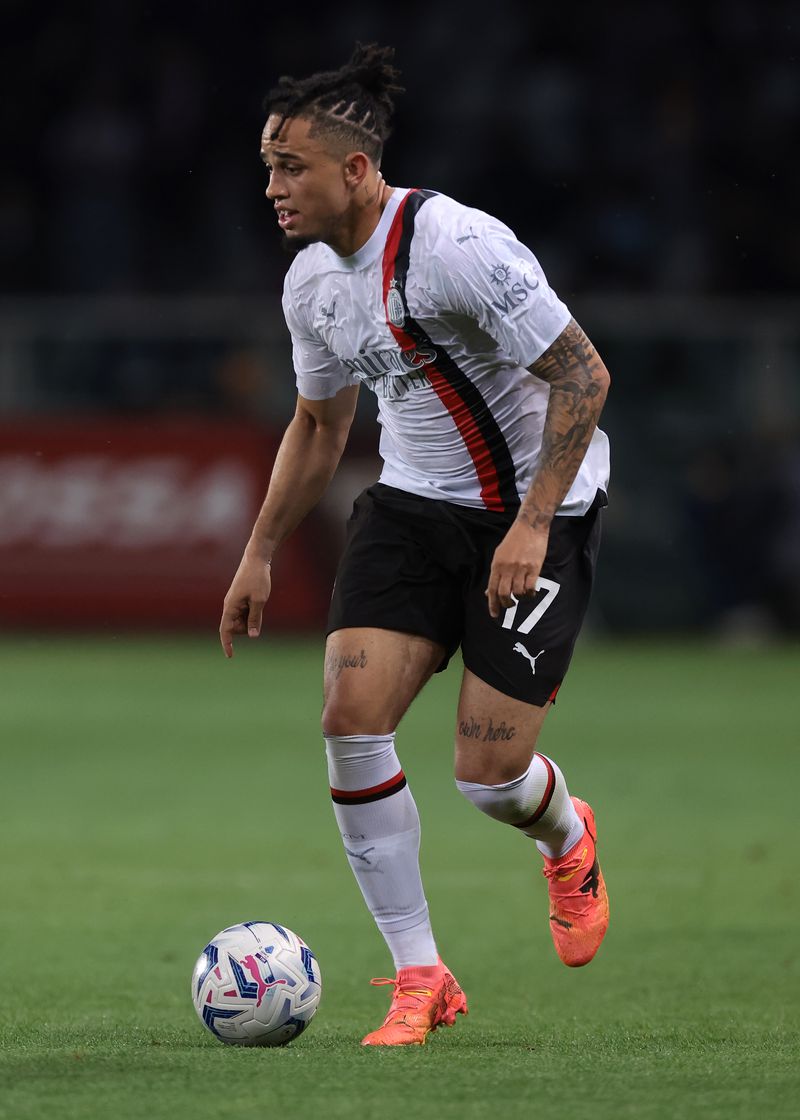
Photo by Jonathan Moscrop/Getty Images
Switzerland still has the midfield technicians and passing quality to control matches, but its ceiling and ability to challenge Germany in the group will come down to whether its youthful attackers can make a leap.
For me, the Swiss are the clear second in this group after Germany, despite some proclamations about Hungary and Scotland as potential underdog stories. In the round of 16, the runner-up in Group A will play the runner-up in Group B, which, barring a shocking upset by Albania, will almost certainly be Italy, Spain, or Croatia. Given Switzerland’s surprise victory over France in Euro 2020, anything is possible from there.
Player to watch: Noah Okafor (AC Milan)
Bet: Group A straight forecast: Germany first, Switzerland second (+170)
12. Serbia (Group C)
All three of the non-England teams in this group (Serbia, Slovenia, Denmark) are ranked between 12 and 18 in my rankings, which could make it a competitive race for second and the best four third-place teams (which also qualify for the knockout round). In fact, all three teams could even steal a point from England, given the pragmatic nature that squad has shown in group stages in the past.
Serbia has plenty of attacking talent but also plenty of questions about goal prevention. Its most recent World Cup was an example of this. Any team that can roll out Filip Kostic, Aleksandar Mitrovic, Luka Jovic, Dusan Vlahovic, and Sergej Milinkovic-Savic won’t have problems scoring goals.
The Serbians like to use a mid-block out of possession, and it did take a lot of work for Cameroon and Switzerland to play through them in Qatar. But two losses to Hungary in Euro qualifying do raise questions, and Serbia’s defensive metrics will likely limit its ceiling to the round of 16. It failed to keep a clean sheet in its final six qualifying matches against weak competition like Bulgaria, Hungary, Montenegro, and Lithuania. However, in Torino’s Vanja Milinkovic-Savic, the team does have a plus goalkeeper (plus-2.8 post-shot xG saved in Serie A) who can liven up an otherwise straightforward coronation of England in the group stage.
Player to watch: Filip Kostić (Juventus)
13. Denmark (Group C)
Denmark was my favorite dark horse in Euro 2020, and its Cinderella run to the semifinals while rallying around Christian Eriksen was one of the great sporting stories of 2021. After Eriksen collapsed in the first half of Denmark’s first game in Copenhagen, the Danes went on to roll Russia, Wales, and the Czech Republic en route to an epic semifinal clash with England at Wembley.
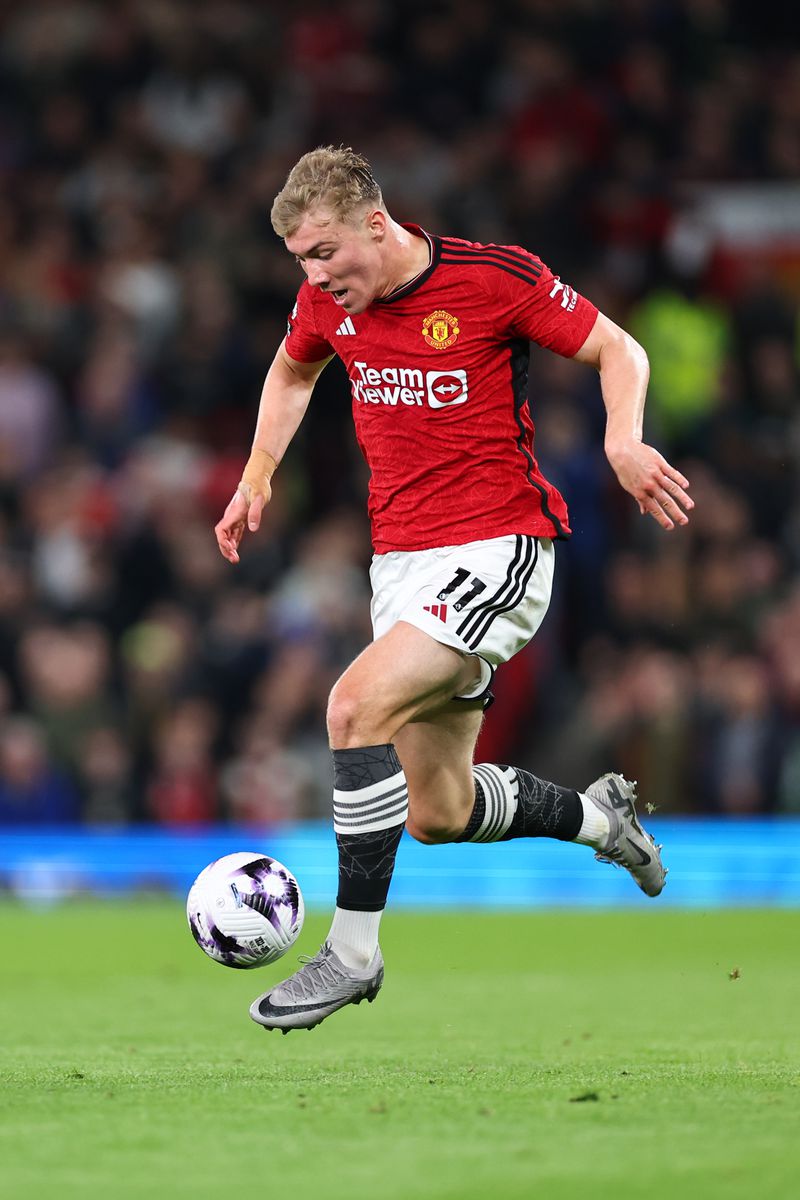
Getty Images
The Danes hoped to ride that wave into Qatar 2022, but the team got old very quickly. Eriksen, Kasper Schmeichel, Simon Kjaer, and Thomas Delaney were the spine of this team, and they’re all well past 30 now. Pierre-Emile Hojbjerg was a critical defensive midfielder, but he’s barely played at Spurs this season. They are reliant on Rasmus Hojlund for goals, but he averaged fewer than two shots per match at Manchester United this year.
They also won’t get to play all of their group matches at the Parken Stadium in Copenhagen again. The well-managed team used to press and play out of possession as well as any in the world, but its aging core and decline in attacking output have it very vulnerable entering Euro 2024. This Denmark core will always have a special place in my heart, even if it looks a notch worse than it did in 2022.
Player to watch: Rasmus Hojlund (Manchester United)
14. Czech Republic (Group F)
The Czech Republic really stands out in terms of its defensive intensity out of possession. It has a high work rate without the ball and can trouble teams with its physicality in the air and willingness to—to borrow an English phrase—get stuck in. Given that international soccer isn’t typically played at the same blistering pace as the club game, the Czechs are a difficult out. They made a run to the Euro 2020 quarterfinals after upsetting the Netherlands.
Their qualifying defensive metrics were among the best of anyone in the competition, but their schedule was among the weakest. (Their qualifying group included Albania, Poland, Moldova, and the Faroe Islands.) Patrik Schick and Adam Hlozek are the two attackers most likely to do damage, after they had an excellent season at Leverkusen filled with late goals and trophies. Schick famously shared the Golden Boot with Ronaldo in Euro 2020—and scored an absolute wonder goal to help him earn it.
Portugal isn’t infallible at the top of Group F, and the Czech Republic’s final group match against Turkey is likely to decide second.
Player to watch: Patrik Schick (Bayer Leverkusen)
15. Turkey (Group F)
Three years ago, Turkey was probably your favorite soccer pundit’s favorite sleeper team in Euro 2020. It opened the tournament in Rome and lost 3-0 against Italy. Two matches later, Turkey crashed out with consecutive losses to Wales and Switzerland.
For my money, Turkey has the most underrated double pivot in the entire tournament, Salih Ozcan and Hakan Calhanoglu. Ozcan adds the ball-winning and out-of-possession intensity, while Calhanoglu adds a ton of passing value in a deep-lying midfielder role. There are questions about whether they are defensively solid enough as a pair. Turkey also has Benfica’s Orkun Kokcu, who struggled in his first year with the club but could be an excellent piece to add even more progressive passing and ball carrying to this team.
It’s easy to be biased by the three-match sample from Euro 2020, but it is much more likely than not that Turkey will make it to the knockout stage given that it’s in a weaker group (rounded out by a “just happy to be here” Georgia).
Player to watch: Hakan Calhanoglu (Inter Milan)
16. Ukraine (Group E)
Ukraine has more talent than its underlying statistical profile would suggest it does. It is one of three teams to qualify with a negative xG differential in qualifying, which isn’t a good thing given that the other two teams rank second to last (Georgia) and last (Albania) on this list. I’m giving Ukraine a bump in my rankings because it’s in the wide-open Group E (Belgium, Slovakia, Romania) and because I believe that there’s too much talent on this side to warrant those statistics. Ukraine was with England and Italy in a tough qualifying group and finished tied with Italy in points.

Photo by Alex Caparros/Getty Images
The numbers are also a bit skewed because it played no matches at home due to the ongoing war. Ukraine has a plus shot stopper in goal, Real Madrid Champions League hero Andriy Lunin. Oleksandr Zinchenko has been a consistent performer on the national team for years, and his passing range should enable him to consistently find Mykhailo Mudryk for wide outlet passes. Up front, Ukraine has La Liga Golden Boot winner Artem Dovbyk. But just one win, two draws, and a loss in the 2022 Nations League against Scotland and Ireland is a pretty mediocre return, and a 3-1 loss to Poland in a friendly on Friday raised more orange flags ahead of the tournament.
Player to watch: Artem Dovbyk (Girona)
17. Hungary (Group A)
I’m officially declaring Hungary as the Euro 2020 Turkey of Euro 2024—in a bad way. After a solid qualifying campaign, the national mood is positive, and there’s a lot of optimism about how Marco Rossi’s side will perform in Germany. Behind Germany, the group isn’t that difficult, and it would be reasonable to expect Hungary to qualify in second place.
I’m still considerably skeptical about Hungary. Dominik Szoboszlai is unquestionably the best player, and they can surprise some teams with direct counterattacks. But the overall talent level isn’t close to that of Switzerland and is arguably below even Scotland in this group.
In qualifying, Hungary didn’t lose any of its eight matches and won its group. But outside of a group headlined by Romania and Switzerland, there was no weaker qualifying group. The argument for Hungary is that it played in a 2022 Nations League group with England, Germany, and Italy and was highly competitive.
It finished with three wins, a draw, and two losses in six matches in that group. It’s shown an ability to punch up against superior teams—even dating back to the group of death in Euro 2020—but I’m here to pour some cold water on Hungary’s upside. I just don’t think Hungary can outduel Switzerland.
Player to watch: Dominik Szoboszlai (Liverpool)
18. Slovenia (Group C)
Slovenia is one of the teams that I think could surprise in this tournament. It hasn’t played in a major tournament since the 2010 World Cup, which USMNT fans will remember well for the famous 2-2 draw in Johannesburg. This is only the second time in the nation’s history that it has qualified for the European Championship. Slovenia showcased an organized 4-4-2 defensive formation throughout the qualifying period and has one of the best goalkeepers in the world in Jan Oblak (Atlético Madrid). Using a passive defensive approach, Slovenia excels in winning aerial duels and cutting down passing lanes.
Slovenia’s attack doesn’t generate much volume because the team rarely has consistent possession. However, Slovenia has an emerging star striker in 21-year-old Benjamin Sesko, who scored 14 goals for RB Leipzig this past season and is attracting Premier League interest this summer. Slovenia has the goalkeeper, defensive organization, and star attacker needed to outperform expectations.
The group is difficult, but Denmark’s age profile and Serbia’s defensive issues could allow Slovenia to pull off a surprise behind England.
Player to watch: Benjamin Sesko (RB Leipzig)
19. Poland (Group D)
Poland claimed one of the final three playoff spots, taking out Wales in a penalty shoot-out after a goalless draw. This Polish side has a good number of peak-age players but is also reliant on 35-year-old striker Robert Lewandowski and 34-year-old goalkeeper Wojciech Szczesny. (Lewandowski has been ruled out for the first group stage match against the Netherlands due to a bicep injury and hopes to return for the second match against Austria.) There’s only one player under the age of 23 on the Poland squad.
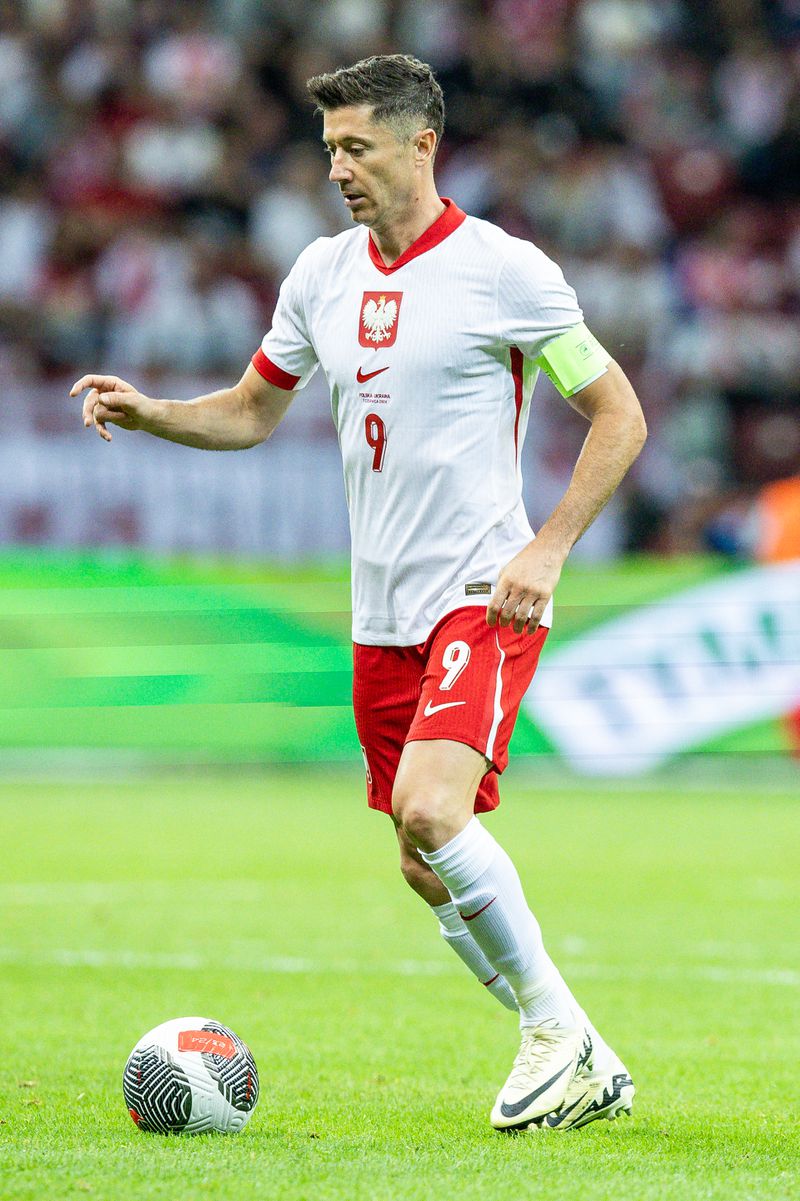
Photo by Foto Olimpik/NurPhoto via Getty Images
Poland has a pretty well-organized defensive side that uses a mid-block as its primary setup. The team’s strength lies in its central midfield, but there are questions about the overall quality of the defensive line and whether it can deal with aggressive transition teams and long balls over the top of the defense. Poland plays a back three that drops into a back five out of possession, and I think it’ll struggle to deal with Austria’s pressing intensity in that crucial match. Drawn into one of the two most difficult groups, along with France, the Netherlands, and Austria, Poland has the worst odds to advance out of Group D.
Even though the Poles have Lewandowski, one of the greatest strikers of his generation, their attacking output in the qualifying match was underwhelming. They finished third in one of the weakest qualifying groups, behind Albania and the Czech Republic. They scored 10 goals in eight matches total, but scored just three in the four games against the fellow qualifying teams and otherwise ran up the score on the weakest teams in the group.
Player to watch: Robert Lewandowski (Barcelona)
20. Slovakia (Group E)
Slovakia got drawn into the least competitive group, with Ukraine, Belgium, and Romania, opening the door for the team to potentially advance. The oddsmakers have it as the clear weakest team in the group, but it’s hard to see much of a gap between Slovakia and Romania. This is the third consecutive Euro appearance for Slovakia, and while it made the knockout stage in 2016, an opening win against Poland in 2020 wasn’t enough to advance after Spain beat the team 5-0 in the final group match and ruined its goal difference.
Slovakia relied on 11 different scorers during the qualifying period, mainly because it doesn’t have a reliable goal scorer since the retirement of Marek Hamsik. The team’s strength is in the spine, with center back Milan Skriniar, reliable goalkeeper Martin Dubravka, and the double pivot of Ondrej Duda and Stanislav Lobotka, who all play in Europe’s top five leagues.
Player to watch: Milan Skriniar (Paris Saint-Germain)
21. Scotland (Group A)
Scotland played two of its three games in Euro 2020 at Glasgow’s Hampden Park, losing to both Croatia and Czech Republic. The Scots finished dead last in the group and then failed to qualify for the World Cup in 2022. But then they stunned Spain 2-0 in the second qualifying match for this tournament thanks to a Scott McTominay brace, and they added wins against Georgia and Norway.
The recent stretch hasn’t been nearly as impressive; they dropped points in the second matches against Georgia and Norway before losing to the Netherlands and Northern Ireland in March friendlies.
The strength of the Scottish team is unquestionably in the midfield, where “false midfielder” McTominay led them in goal scoring during the qualifying period, and he consistently shows up in the penalty area at the right time. Combine this with Premier League players John McGinn, Ryan Christie, and Billy Gilmour in the midfield, and Scotland should hold up in the center of the park. Even with McTominay’s contributions, the problem comes in goal scoring. Scotland is heavily reliant on crossing from wide areas, where Liverpool’s Andrew Robertson is used frequently as an attacking left back high up the pitch. Che Adams hasn’t been a reliable goal scorer, target man Lyndon Dykes is a nonfactor due to an injury, and the attacking statistics through qualifying were pretty mediocre.
Player to watch: Scott McTominay (Manchester United)
Bet: McTominay to lead Scotland in goals (+500)
22. Romania (Group E)
Romania was drawn into the weakest of the six groups, with Belgium, Slovakia, and Ukraine. The oddsmakers have them above Slovakia in the power ratings, and that’s due in large part to Romania’s solid numbers during Euro qualifying. Romania conceded just five goals in qualifying and won the group over the more established Switzerland while not losing a single match. There’s a lot of air in the numbers with Romania, though. It conceded 1.23 xG per match, meaning it would have been expected to concede closer to 12-13 goals across the 10 matches. Romania will not have much possession of the ball in this tournament either; it relies heavily on solid defensive organization and quick-strike transitions to score goals.
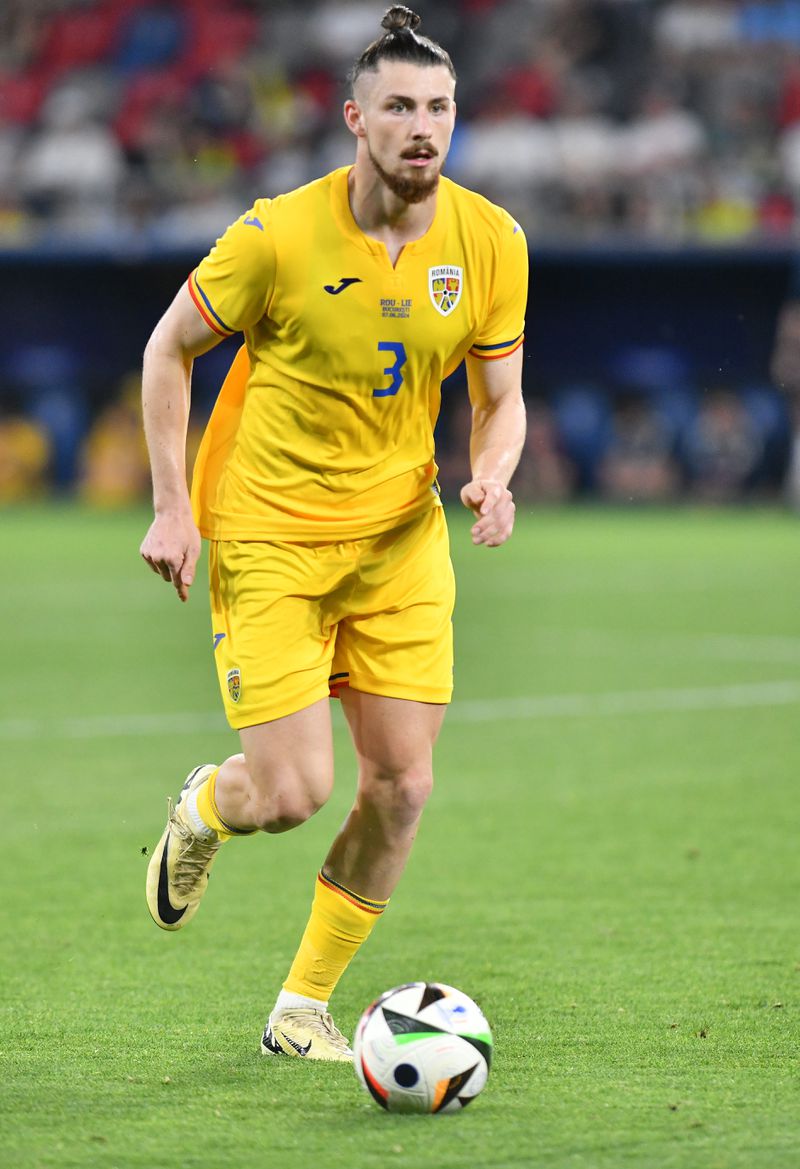
Photo by Cristian Preda/DeFodi Images via Getty Images
The attack depends on the scoring of George Puscas, who spent the entire season on loan in Italy’s second division. The defense is energetic out of possession, cuts down passing lanes, and is excellent in the air, thanks to emerging defender Radu Dragusin. Spurs used Dragusin as an extra defender this year, and he excels at aerial duels.
There’s not much of a gap between Romania and Slovakia for me, making qualifying difficult for both.
Player to watch: Radu Dragusin (Tottenham Hotspur)
Bet: Romania to finish bottom of Group E (+200) and fail to qualify (+110)
23. Georgia (Group F)
Georgia claimed the 24th and final spot in this tournament with a penalty shoot-out victory against Greece in March. It has never played in a major international tournament before and is here only because of its performance in the third tier of the Nations League. Georgia finished fourth in its Euro qualifying group with the worst underlying xG difference (minus-0.75 xGD per match) of any team that qualified. Wins against Luxembourg and a shoot-out against Greece don’t really change the fact that this team has a major talent deficit compared to most of the field. The only reason that Georgia isn’t 24th in these rankings is because of the group it was drawn into.
Georgia has three players on the entire roster who play for clubs in Europe’s top five domestic leagues. The defense will go as far as Valencia goalkeeper Giorgi Mamardashvili can take it, and the attack will rest on the supreme dribbling ability of Napoli winger Khvicha Kvaratskhelia, nicknamed Kvaradona (after the legendary Napoli midfielder Diego Maradona). Ultimately, the team likely won’t go beyond the three group stage matches, and any result or even goal would be historic for the nation.
Player to watch: Khvicha Kvaratskhelia (Napoli)
24. Albania (Group B)
Albania received no favors from the random draw generator that decided the groups for Euro 2024. It’s clearly in one of the two most difficult groups, paired with Spain, Italy, and Croatia. Teams will almost certainly need at least three points to advance as a potential third-place team, which means the Albanians will need to pull off an upset win of significant magnitude to have a chance of advancing to the knockout stage.
It qualified for the tournament by winning its group, which included the Czech Republic, Poland, the Faroe Islands, and Moldova—among the weakest groups in the pool. Albania is one of three teams that qualified for the Euros with a negative expected goal differential in qualifying.
Albania last made it to the Euros in 2016, which makes this the second major tournament appearance in the nation’s history. The team will try to sit in a deep, defensive low block, where it conceded only four goals in eight qualifying matches. Facing three possession-dominant sides that love to control the ball in the midfield, Albania will struggle to score goals more than any other team in the entire tournament after scoring just 12 in qualifying.
Player to watch: Armando Broja (Chelsea)
Bet: Albania under 1.5 goals scored (+110)

